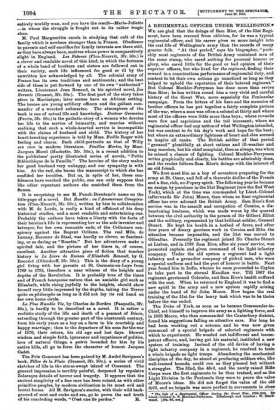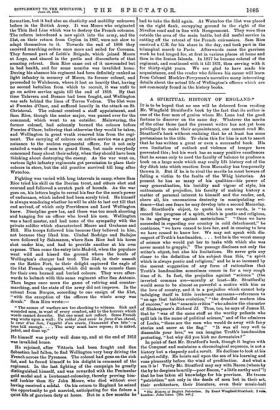A REGIMENTAL OFFICER UNDER WELLINGTON.* WE are glad that the
doings of Sam Rice, of the 51st Regi- ment, have been rescued from oblivion, for he was a typical regimental officer, and his career gives us more insight into the real life of Wellington's army than the records of many greater folk. "At that period," says his biographer, "prob- ably most regiments of the British Army contained men of the same stamp, who cared nothing for personal honour or glory, who cared little for the good or bad opinion of their superior officers, but who lived for the regiment, finding their reward in a conscientious performance of regimental duty, and content to let their own actions go unnoticed so long as they helped to uphold the reputation of their beloved regiment." But Colonel Mockler-Ferryman has done more than revive Sam Rice; be has written round him a very vivid and careful history of the Great War, more especially the Peninsular campaign. From the letters of his hero and the memoirs of brother officers he has put together a fairly complete picture of the war, where a man was often a colonel at thirty and where most of the officers were little more than boys ; where rewards were few and capricious and the toil incessant; where no regimental officer had any notion of what Wellington intended, but was content to do his day's work and hope for the best ; but where an extraordinary lightness of heart and élan seemed. to inspire all ranks. The British soldier of that period " groused" plentifully at short rations and ill-weather and long marches, but his chief complaint, then as always, was when he missed a chance of fighting. Colonel Mockler-Ferryman writes graphically and clearly, his battles are admirably done, and the reader follows Sam Rice's doings with the interest of an old friend.
We first meet him as a boy of seventeen preparing for the army at St. Omer, and full of a theoretic dislike of the French and a fine, rich, no-Popery spirit. The following year be became an ensign by purchase in the 51st Regiment (now the 2nd West York), which at the time was commanded by Lieut.-Colonel (afterwards Sir John) Moore, than whom no finer regimental officer has ever adorned the British Army. Sam Rice's first service was in the assault and occupation of Corsica, a dis- heartening business, which was made worse by the quarrel between the civil authority in the person of Sir Gilbert Elliot and the military, represented by that brilliant soldier, General Stuart. He kept his health in a hotbed of fever, and after four years of dreary garrison work in Corsica and Elba the situation became impossible, and the 51st was moved to Gibraltar. Presently the regiment joined Sir Charles Stuart at Lisbon, and in 1798 Sam Rice, after six years' service, was promoted captain and given command of the light infantry company. Under the old system a regiment had a light infantry and a grenadier company of picked men, who wore a special uniform and had the post of honour in battle. Next year found him in India, whence be soon proceeded to Ceylon to take part in the eternal Kandian war. Till 1807 the regiment garrisoned Colombo, and Sam Rice's health suffered with the rest. When he returned to England it was to find a new spirit in the army and a new system rapidly arising under the hand of Sir John Moore. Now began the real training of the 51st for the heavy task which was to be theirs before the war ended.
The Duke of York, as soon as he became Commander-in- Chief, set himself to improve the army as a fighting force, and in 1802 Moore, who then commanded the Canterbury district, found his suggestions falling on attentive ears. For long ho had been working out a scheme, and he was now given command of a special brigade of selected regiments with which to experiment. He weeded out indifferent and incom- petent officers, and, having got his material, instituted a new system of training. Instead of the old device of having a light infantry company in a regiment, he resolved to train a whole brigade as light troops. Abandoning the mechanical discipline of the day, he aimed at producing soldiers who, like well-trained hounds, could run as they pleased but without a straggler. The 52nd, the 43rd, and the newly raised Rifle Corps were the first regiments to be thus trained, and as the Light Division in the Peninsula they were to prove the value of Moore's ideas. He did not forget the value of the old drill, and no brigade was more perfect in movements in close • The Life of a Regimental Officer during the Great War, 1793-1815. By Lieut.-Colonel A. F. Mockler-Perryman. Edinburgh and London : W. Black- wood. 1.10a. Od. set.]
formation, but it bad also an elasticity and mobility unknown before in the British Army. It was Moore who originated the Thin Red Line which was to destroy the French columns. The reform introduced a new spirit into the army, and the 51st, on their return from Ceylon in 1807, were not slow to adapt themselves to it. Towards the end of 1808 they received marching orders once more and sailed for Corunna.
They formed part of Leith's Brigade, which joined Moore at Lugo, and shared in the perils and discomforts of that amazing retreat. Sam Rice came out of it unwounded but in bad health, and for some months was invalided home.
During his absence his regiment had been definitely ranked as light infantry in memory of Moore, its former colonel, and proceeded to Walcheren, where it lost so heavily that, having no second battalion from which to recruit, it was unfit to go on active service again till the end of 1810. By that time Talavera and Busaco had been fought, and Wellington was safe behind the lines of Torres Yedras. The 51st were at Fuentes d'Onor, and suffered heavily in the attack on St. Christoval. The colonel received a staff appointment, and Sam Rice, though the senior major, was passed over for the command, which went to an outsider. Mainwaring, the former colonel, had solemnly burned the colours before Fuentes d'Onor, believing that otherwise they would he taken, and Wellington in great wrath removed him from the regi- ment. The carrying of colours on active service was a great nuisance to the zealous regimental officer, for it not only entailed a waste of men to guard them, but made everybody concerned fussy about their safety, when they should have been thinking about destroying the enemy. As the war went on, various light infantry regiments got permission to place their colours in store, but the old practice survived till long after Waterloo.
Fighting was varied with long intervals in camp, where Sam Rice tried his skill on the Iberian trout, and others shot and coursed and followed a scratch pack of hounds. As the war goes on, his letters begin to reveal his fear for the men's power of endurance, which indeed had been sorely tried. He himself is always wondering whether he will be able to last out till that end arrived, of which only Providence and Lord Wellington knew. Discipline grew lax, and there was too much shooting and hanging for an officer who loved his men. Wellington was a hard master, and had none of the sympathy with the private soldier which characterized Moore and Grahame and Hill. His troops followed him because they believed in him, not because they liked him. Ciudad Rodrigo and Badajos were followed by Salamanca, where Sam Rice had his horse shot under him, and had to provide another at his own expense. Then came the entry into Madrid, when the populace went wild and kissed the ground where the hoofs of
-Wellington's charger bad trod. The 51st, in their assault on the Retiro Fort, to their delight captured the eagle of the 51st French regiment, which did much to console them
for their own burned and buried colours. They were after- wards to hobnob with this same regiment after San Antonio. Then began once more the game of retiring and counter- marching, and the state of the army did not improve. In the retreat from Burgos, according to one ensign of the 51st, " with the exception of the officers the whole army was drunk." Sam Rice wrote :—
" The scenes of warfare are too shocking to witness. Sick and wounded men, in want of every comfort, add to the horrors which words cannot describe. But one must not reflect. Some French wag wrote upon a wall: [In soldat faut avoir la force d'un cheval, le eceur d'un lion, l'appetit d'un souris, l'hurnanite d'un '—a true bill enough. . . . The army must have repose; it is naked, jaded, and done up."
He himself was pretty well done up, and at the end of 1812 was invalided home.
He rejoined, after Vittoria had been fought and San Sebastian had fallen, to find Wellington very busy driving the French across the Pyrenees. The colonel had gone on the sick list, and he found himself to his delight in command of the regiment. In the last fighting of the campaign he greatly distinguished himself, and was rewarded with the Peninsular gold medal and a lieutenant-colonelcy, thereby proving him- self luckier than Sir John Moore, who died without ever having received a medal. On his return to England he seized the opportunity to get married, anticipating for the future a quiet life of garrison duty at home. But in a few months he
had to take the field again. At Waterloo the 51st was placed on the right flank, occupying ground to the right of the Nivelles road and in line with Rougoumont. They were thus outside the area of the main battle, but did useful service in cutting off the retreat of the French cuirassiers. Sam Rice received a C.B. for his share in the day, and took part in the triumphal march to Paris. Afterwards came the garrison work he had longed for, at first in various places at home and then in the Ionian Islands. In 1817 he became colonel of the regiment, and continued with it till 1831, thus serving with it for thirty-eight years. We are glad to have made his acquaintance, and the reader who follows his career will learn from Colonel Mockler-Ferryman's narrative many interesting details about the actual life of Wellington's officers which are not commonly found in the history books.



























































 Previous page
Previous page